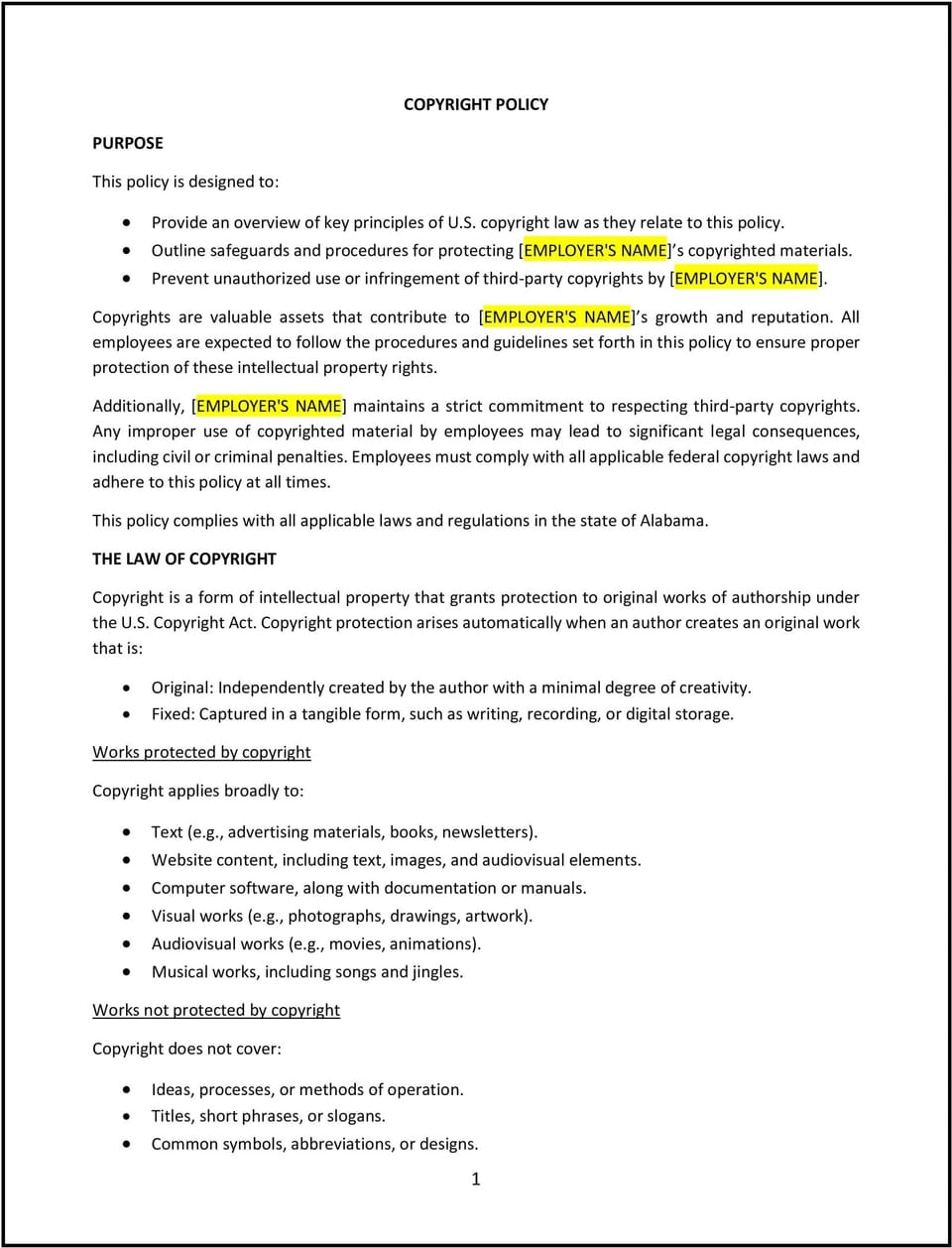Copyright policy (Alabama): Free template

Copyright policy (Alabama)
A copyright policy provides clear guidelines on how your business handles intellectual property (IP) rights, ensuring compliance with copyright laws. For SMBs in Alabama, this policy is essential for protecting your own copyrighted works while respecting the intellectual property rights of others. Tailoring this policy to your business helps prevent infringement, fosters respect for creativity, and ensures legal compliance.
This policy also defines how your company approaches the creation, use, and distribution of copyrighted material, whether it’s content you produce or materials you license.
How to use this copyright policy (Alabama)
- Define copyrighted works: Specify what types of works are covered by the policy, such as written content, designs, software, and multimedia.
- Clarify ownership: Establish who owns the copyright to content created by employees, contractors, or freelancers. This could include terms for work-for-hire agreements or usage rights.
- Set guidelines for use: Clearly outline how employees and third parties are allowed to use copyrighted material, including any restrictions, licensing terms, or fair use guidelines.
- Address infringement: Define the process for handling cases of potential copyright infringement, including reporting mechanisms, internal investigations, and corrective actions.
- Ensure compliance with Alabama and federal laws: Align your policy with the U.S. Copyright Act and any relevant Alabama state laws to prevent legal issues related to copyright ownership and infringement.
Benefits of using a copyright policy (Alabama)
A well-structured copyright policy protects your business’s intellectual property while promoting a culture of compliance. Here’s how it helps:
- Prevents copyright infringement: By clearly defining ownership and usage rights, you minimize the risk of infringing on others' copyrighted work.
- Safeguards intellectual property: Protects your business’s creations, such as designs, products, software, and written content, from unauthorized use or reproduction.
- Ensures legal compliance: Helps your business adhere to Alabama and federal copyright laws, avoiding potential legal consequences.
- Promotes ethical use of IP: Encourages employees and third parties to respect intellectual property rights, fostering an environment of creativity and innovation.
- Enhances brand protection: Ensures your brand’s content is used properly and attributed correctly, protecting your reputation and original works.
Tips for implementing a copyright policy (Alabama)
- Tailor to your industry: Customize the policy based on your business’s industry and the type of content you produce. For example, a media company may need specific clauses regarding licensing and distribution rights for creative content.
- Consider fair use: Include clear guidelines on how employees can use copyrighted materials under the "fair use" doctrine, such as for educational or commentary purposes, in compliance with the law.
- Track licenses and permissions: Keep records of any third-party licenses or permissions obtained for using external content, ensuring all necessary rights are secured.
- Establish an infringement response protocol: Develop a clear procedure for identifying and addressing copyright infringement, including how to issue takedown notices if necessary.
- Educate employees: Provide regular training on copyright law, what constitutes infringement, and how to properly handle copyrighted material in their daily work.
Q: What is considered copyrighted material under this policy?
A: Copyrighted material includes original works of authorship, such as literary works, music, software, artistic works, and even certain business processes or branding elements that are fixed in a tangible medium.
Q: Who owns the copyright to work created by employees?
A: In most cases, the business owns the copyright to work created by employees as part of their job, unless otherwise specified in an agreement. For contractors, ownership typically depends on the contract terms.
Q: Can employees use copyrighted content from external sources?
A: Employees can use copyrighted content if they have proper permission, such as through licensing or fair use, or if the content is in the public domain. The policy should specify the conditions under which this is allowed.
Q: How should employees report potential copyright infringement?
A: Employees should report any suspected infringement through the designated channels outlined in the policy, which could include notifying the legal department or management.
Q: What happens if our company infringes on someone else’s copyright?
A: If your company infringes on another party’s copyright, you may need to remove the infringing material, resolve the issue through negotiation or a settlement, and take corrective action to prevent further violations.
Q: Is this policy only for copyrighted works created by the company?
A: No, this policy applies to all copyrighted works that the company creates, uses, or distributes, as well as the copyrighted works of third parties that the company licenses or uses.
This article contains general legal information and does not contain legal advice. Cobrief is not a law firm or a substitute for an attorney or law firm. The law is complex and changes often. For legal advice, please ask a lawyer.


